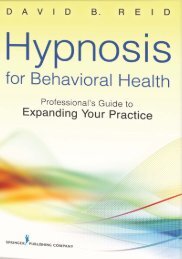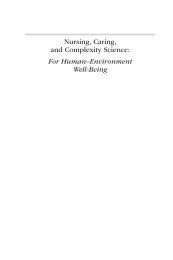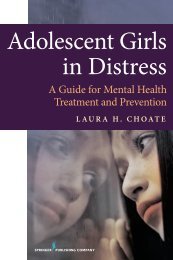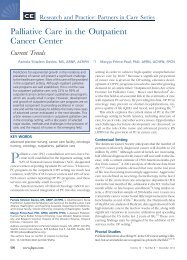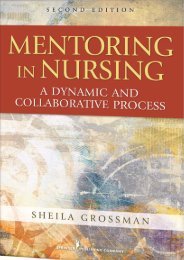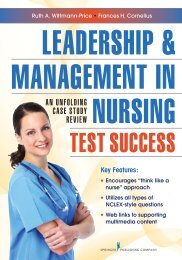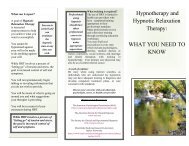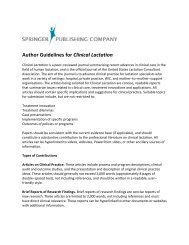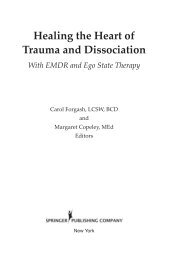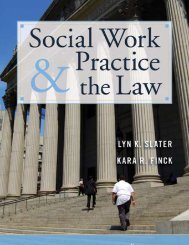Expertise in nursing practice : caring, clinical judgment - Springer ...
Expertise in nursing practice : caring, clinical judgment - Springer ...
Expertise in nursing practice : caring, clinical judgment - Springer ...
Create successful ePaper yourself
Turn your PDF publications into a flip-book with our unique Google optimized e-Paper software.
Chapter 1 The Relationship of Theory and Practice <strong>in</strong> the Acquisition of Skill 5<br />
This is where Platocame to the aid of Socrates. Plato suggested that<br />
experts wereoperat<strong>in</strong>g on pr<strong>in</strong>ciplesthey could not articulate.Heclaimed<br />
that experts, at least <strong>in</strong> areas <strong>in</strong>volv<strong>in</strong>g nonempirical knowledge such<br />
as morality and mathematics, had <strong>in</strong> another life learned the pr<strong>in</strong>ciples<br />
<strong>in</strong>volved, but they had forgottenthem. The roleofthe philosopher was to<br />
help suchmoral and mathematical experts recall the pr<strong>in</strong>ciples on which<br />
they were act<strong>in</strong>g. These pr<strong>in</strong>ciples would ground the skill. Knowledge<br />
must be “fastenedbythe reason<strong>in</strong>g of cause and effect” and “this is done<br />
by ‘recollection’” (Meno Plato, 1937, p. 98a).<br />
Ageneration after Plato, Aristotle already suspected that someth<strong>in</strong>g<br />
crucial had been left out of Plato’s medical model of knowledge. Rather<br />
than see<strong>in</strong>g the ability to give reasons fortheir actions—like doctors—as<br />
the test of expertise, Aristotle seesprecisely the immediate, unreasoned,<br />
<strong>in</strong>tuitive response as characteristic ofan expert craftsman. In his book<br />
Physics, Aristotle states, “Art (techne) doesnotdeliberate.” (PhysicsBook<br />
II, Ch. 8 p. 200b) Moreover, Aristotle was clear that even if there were<br />
universal pr<strong>in</strong>ciples based on atheory, <strong>in</strong>tuitive skill was needed to see<br />
howthe pr<strong>in</strong>ciples applied<strong>in</strong>each particular case.He derives an illustration<br />
from ethics, which Plato thought must be based on universal rules:<br />
“Itisnot easy to f<strong>in</strong>d a formula by whichwe may determ<strong>in</strong>e how far and<br />
up to what po<strong>in</strong>t a man may go wrong before he <strong>in</strong>curs blame” (Aristotle,<br />
1952, Physics Book, Ch. 8 199b). He then adds, “But this difficulty of<br />
def<strong>in</strong>ition is <strong>in</strong>herent <strong>in</strong> every object of perception: suchquestions of degree<br />
are bound up with the circumstances of the <strong>in</strong>dividual case, where<br />
our only criterion isthe perception” (p. 199b).<br />
The same would,ofcourse, apply to medic<strong>in</strong>e. The two areas where<br />
theory imp<strong>in</strong>ges on theconcrete case, diagnosis, and treatment are areas<br />
that would require experience and <strong>in</strong>tuition. Aristotle was right. Expert<br />
diagnostic systems such asthecomputer programs MYCIN and<br />
INTERNIST based on pr<strong>in</strong>ciples but without <strong>in</strong>tuition and <strong>judgment</strong><br />
do better than the nonexpert but have failed tocapture the specialist’s<br />
expertise.<br />
A systematicevaluation of MYCIN was reported<strong>in</strong>The Journal of the<br />
American Medical Association (Yu et al., 1979). MYCIN was given data<br />
concern<strong>in</strong>g ten actual men<strong>in</strong>gitis cases and was asked to prescribe drug<br />
therapy. Its prescriptions were evaluated by a panel of eight <strong>in</strong>fectious<br />
disease specialists who had published cl<strong>in</strong>ical reports deal<strong>in</strong>g with the<br />
management of men<strong>in</strong>gitis. These experts rated asacceptable 70% of<br />
MYCIN’s recommended therapies (Yu et a1.).



